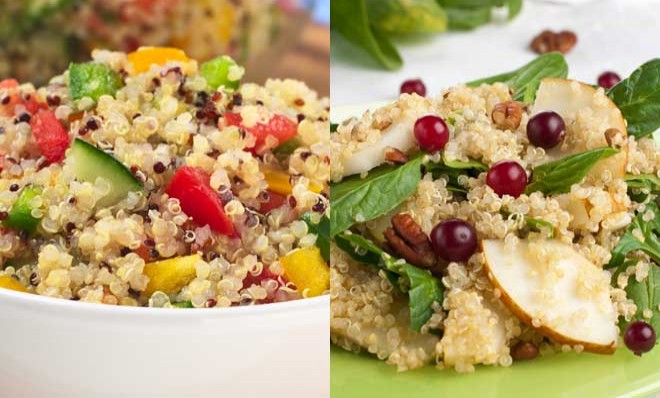Is eating quinoa evil?
The price of the "miracle grain" is soaring as foodies gobble it up. And that may be bad for people in Peru and Bolivia, where quinoa has long been a staple


A free daily email with the biggest news stories of the day – and the best features from TheWeek.com
You are now subscribed
Your newsletter sign-up was successful
Quinoa, long the staple grain of the Andes, has become a hit with first-world foodies. Once only available in natural-food markets, quinoa is now on sale in grocery stores just about everywhere. Adventurous eaters have embraced it as a slightly bitter alternative to rice or couscous. Vegans gobble it up as a substitute for meat, thanks to its high protein content (up to 18 percent). But as the popularity of the "miracle grain" has soared, so has its price, tripling since 2006. Now, some say, the "unpalatable truth" is that the appetite for quinoa in wealthy countries has pushed up its price so much that poorer Peruvians and Bolivians can no longer afford it. "Call it the quinoa quandary," says Paul Wachter at Esquire. Is this a case where eating healthy is causing others harm? Should foodies and vegans go easy on the quinoa?
That's "an oversimplification at best," says Ari LeVaux at Slate. "At worst, discouraging demand for quinoa could end up hurting producers rather than helping them." It's true that people in quinoa-growing areas are now eating less of the longtime staple, but that's partly because the extra income farmers are seeing from rising quinoa prices is allowing them to diversify their diets, adding things like fresh vegetables that they once couldn't afford.
Most of the world's quinoa is grown on the altiplano, a vast, cold, windswept, and barren 14,000-foot Andean plateau spanning parts of Peru and Bolivia. Quinoa is one of the few things that grow there, and its high price means more economic opportunities for the farmers in one of the poorest parts of South America. [Slate]
So far, quinoa has "generally been a success for the people who grow it," according to Tom Philpott at Mother Jones. But it's also getting so popular that farmers are now growing it in the Colorado Rockies and testing it in the Pacific Northwest, and if we wind up with a global glut, Peruvians and Bolivians really could pay dearly.
The Week
Escape your echo chamber. Get the facts behind the news, plus analysis from multiple perspectives.

Sign up for The Week's Free Newsletters
From our morning news briefing to a weekly Good News Newsletter, get the best of The Week delivered directly to your inbox.
From our morning news briefing to a weekly Good News Newsletter, get the best of The Week delivered directly to your inbox.
A global expansion of quinoa production could also cause its price to crash — as happened to coffee in the late 1990s after Vietnam charged into coffee farming, causing a global glut. If a quinoa glut drove prices low enough, Andean farmers' investments in land and processing infrastructure would be wiped out. [Mother Jones]
Look, some Bolivians are quinoa consumers feeling the sting of rising quinoa prices, and some are farmers reaping the benefits, writes Virginia Heffernan at Yahoo News. Agricultural economists still haven't sorted out how the good measures up to the bad.
The important thing, then, is to follow the food without getting ideological, not only about wholesome classy quinoa, but also about delicious tawdry Coca-Cola, that bugbear of foodies who are perpetually disgusted to discover that the feeble-minded among us still like a little sugar with our water. Eat what you want, but stop preaching about it, and it surely can't hurt to leave some Andean quinoa for the people of the Andes. [Yahoo]
A free daily email with the biggest news stories of the day – and the best features from TheWeek.com
Harold Maass is a contributing editor at The Week. He has been writing for The Week since the 2001 debut of the U.S. print edition and served as editor of TheWeek.com when it launched in 2008. Harold started his career as a newspaper reporter in South Florida and Haiti. He has previously worked for a variety of news outlets, including The Miami Herald, ABC News and Fox News, and for several years wrote a daily roundup of financial news for The Week and Yahoo Finance.
-
 Why is the Trump administration talking about ‘Western civilization’?
Why is the Trump administration talking about ‘Western civilization’?Talking Points Rubio says Europe, US bonded by religion and ancestry
-
 Quentin Deranque: a student’s death energizes the French far right
Quentin Deranque: a student’s death energizes the French far rightIN THE SPOTLIGHT Reactions to the violent killing of an ultraconservative activist offer a glimpse at the culture wars roiling France ahead of next year’s elections
-
 Secured vs. unsecured loans: how do they differ and which is better?
Secured vs. unsecured loans: how do they differ and which is better?the explainer They are distinguished by the level of risk and the inclusion of collateral
